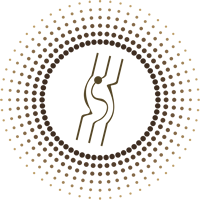
The nervous system is an extensive network of cells specialized to conduct information in the form of impulses that controls, regulates and co-ordinates all functions of the body.
The nervous system includes the brain and spinal cord (together known as the central nervous system); the cranial nerves, which connect the brain to the head; and the peripheral nerves, which run from the spinal cord to all other parts of the body. The peripheral nerves are named after the four parts of the spine from which they branch: the cervical (neck), thoracic (chest), lumbar (lower back), and sacral (pelvis) areas.
The nervous system also includes sensory organs such as the eye and ear.
Nerves supply all organs, muscles and glands. Nerves permeate the whole body; pain is felt by special nerve receptors.
Function: regulation of body function through nerve impulses.
Central Nervous System: (Voluntary) brain, spinal cord, peripheral nerves/ganglia
Autonomic Nervous System: (Involuntary) is divided into two parts, which function one at a time.
- Sympathetic
- Parasympathetic
Sympathetic Nervous System (Fight or Flight)
When this system is activated, there are changes which take place in the body; adrenalin is secreted, heart rate increases, blood pressure increases, blood sugar increases, breathing changes, digestion stops, blood is pumped to arms and legs, pupils dilate. The body prepares to react to danger. Animals either run or fight. Civilized man can do neither in most stress situation, yet all these physiological changes are happening creating tension and anxiety.
Parasympathetic Nervous System (Rest and Repair)
When the body is in a deep state of relaxation, digestive processes take place, peristalsis occurs in the intestines, blood flow increases to the abdomen; it is generally the state of sleep and meditation. Healing can only take place when the nervous system is in a parasympathetic function during rest periods.
To support the nervous system:
Herbs: valerian, hops, skullcap, lobelia, lady’s slipper
Minerals: calcium, phosphorus, manganese, iodine, iron, magnesium, potassium, zinc
Vitamins: A, B-complex, B1 (thiamine), B2 (riboflavin), B3 (niacin), B5 (pantothenic acid), B6 (pyridoxine), B12 (cyanocobalamin), B13 (orotic acid), B15 (pangamic acid), C, D, E, F (Fatty acids), choline, folic acid, inositol
Essential Oils:
The essential oils of chamomile, bergamot, sandalwood, lavender and sweet marjoram have a sedative effect on the central nervous system which is helpful for nervous tension, stress and insomnia.
The essential oils of jasmine, peppermint, basil, clove and ylang ylang have a stimulating effect; helpful for convalescence, lack of strength and nervous fatigue.
Some oils are known to be ‘adaptogens’, meaning they have a balancing or normalizing effect on the systems of the body. Geranium and rosewood are either sedative or stimulating according to each situation and individual.
Nerve tonics (nervines) for strengthening the nervous system as a whole include chamomile, clary sage, juniper, lavender, marjoram and rosemary.
If you appreciate the information provided,
please help keep this website running. Blessings!
© 2008-2025 aromaworx.ca. All rights reserved.

